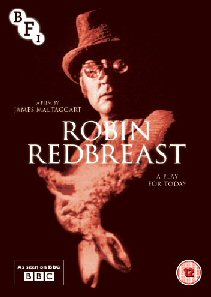
The BBC 'Play For Today' entitled Robin Redbreast is perhaps best-known by reputation; I certainly knew it as an antecedent to eponymous British horror The Wicker Man, although, like many other people I suspect, I hadn't actually seen it. Happily, the new BFI release has put that right with real panache here, proving once again that they have a keen eye for lost classics or lesser-viewed classics.
Newly-single thirty something Norah Palmer (Anna Cropper), script-writer by trade, is struggling to come to terms with being single again after her long-term partner decided to cut his losses. Feeling past it, and a bit vulnerable, Norah decides to make a fresh start by moving out to a cottage in a remote English village. Here, she feels that it will be easier to adjust to living alone; the locals are decidedly eccentric, but seem welcoming, and the house is dilapidated compared to life in the city, but Norah's still determined. Village life it is, with only the odd sojourn to town when she needs it.
Norah quickly strikes up a friendship with a young man called 'Rob', or Edgar (the latter being his given name; the other is a nickname), with whom of all the villagers she seems to have most in common, as he was originally an outsider himself, and even has a bit of book learnin'. Sure, he's not the most scintillating conversational partner, but regardless of that, one night he and Norah end up in bed together and soon afterwards, she's shocked to discover that she's pregnant. As if this wasn't enough to contend with, she begins to get the distinct impression that the whole seduction was a set-up, and that the village knows something she doesn't know. Is she just paranoid, or is she part of a bigger picture?
Of course, all of that will sound familiar, but it's important to remember that Robin Redbreast is three years older than The Wicker Man, and it has its roots in an earlier tradition of stories, too. It's definitely a great choice for a release; it does feel like a missing link in the history of pagan horror, particularly that with an authentically British vibe. The unfolding of the tale is subtle, engaging and effective, with a slow drip drip drip of paranoia which makes you feel afraid for Norah. It's also a fascinating time and place for horror, and the fact that we have a female protagonist allows some of the issues of the day to make their way to the fore. We have a woman who, in her own words, is 'middle-aged'; she reflects on this, but not only does her fertility run through this film as integral to all that goes on, but her libido is a factor too. Where Sergeant Howie could resist Willow, Norah can't resist her young suitor. And then, the fact of a single woman becoming pregnant in 1970 means far different repercussions to a single woman becoming pregnant thirty years later, say. In 1970 abortion was legal though only just, and not easily accessible; the Pill was around, but wasn't available to single women until 1974; and single motherhood was still very stigmatising. All of this is integral, in its way, to the sense of inescapability at the heart of this tale.
Considering when this was made and by whom, Robin Redbreast is a daring project in many ways. It's very earthy from the sex aspects to the village gossip and cleaning lady Mrs Vygo eviscerating a chicken in the kitchen sink; nature is seen as problematic and unsettling in several ways, rather than prettified and restful. The script here is very good throughout, too, with a quiet wit and moments of pointed criticism from Norah of her new-found situation. There are many references to 'the old ways' here, too, many of which reminded me strongly of M R James; everything is quintessentially English, a blend of quaint and eerie, something which hasn't entirely gone away even now, if you ever find yourself in the middle of nowhere on the Fens...
Robin Redbreast may be over forty years old and it may be a TV play, but it knows how to develop a sense of foreboding; it provides us with some shocks, too just enough to pack a punch. With an excellent conclusion which seems to say that stories are 'only stories', but reminds us what people will do in their name, this is a must for anyone with an interest in the genre. As usual, BFI have put together a sumptuous package here, too, with a clear remastering (in a 1:33:1 ratio), a crisp soundtrack, and extras in the form of an interview with director John Bowen, a short film on English village life, and a great illustrated booklet with contextualising essays/biographies by Vic Pratt, William Fowler, Oliver Wake and Alex Davidson.
Review by Keri OShea
| Released by Bfi |
| Region 2 |
| Rated 18 |
| Extras : see main review |